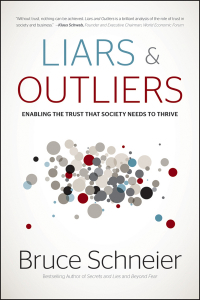Take a photo of a barcode or cover
True but disappointing relative to Schneier's other work: while his blog posts and public appearances are cutting and succinct, this falls victim to the habit of over-exampling and under-specifying ideas.
True but disappointing relative to Schneier's other work: while his blog posts and public appearances are cutting and succinct, this falls victim to the habit of over-exampling and under-specifying ideas.
On one side the book was a bit boring, a bit too long and a bit repetitive, on the other side the content is very interesting and related to many different areas (like economics). I think it is a first "boring" book that I feel I should (and hope I will) read once or twice again to fully comprehend.
Really informative look at the what helps members of society act rationally and allows society to function. Schneier explains many of the commons models of trust that exist at different layers of society and provides examples of each. I would have preferred to have the examples be a little more in depth and most of them were covered at a very high level. I guess that would make this a good jumping off point to other books which go in depth on any of the failures mentioned in the book. Overall I really enjoyed the book it was a very easy read and I recommend it.
An interesting read, but nothing ground breaking if you're a following of Bruce Schneier's blog or have read any of his opinion columns regarding trust and security.
The book covers the concepts of trust, and security and examines our natural instincts in relation to these often fail in the face of new technology and the growth of society. Much time is spent examining various difficult to solve social dilemmas in the context of this, and the introduction of background material from the fields of Psychology and Sociology provides interesting (if obvious in hindsight) snippets to demonstrate our typical behaviour in this area.
The biggest downside of the book is simply that it attempts to cover a huge range of material across all these subjects and although it mostly succeeds in presenting a coherent narrative and argument, there is certainly no detailed examination of any of the background material or premises. The text of the book ends at around 60% of the way through the Kindle ebook, the remaining pages taken up by copious indices, references and supporting notes, which I guess is a useful resource if you are fascinated enough by the topic to invest further time in it.
For me personally, I felt that I'd got all I could get from it by this point and wasn't inclined to follow any of the references, but it did leave me feeling like the book was only half finished. If the book instead substituted that space with less direct references and more critical evaluation of how the framework the book explains could be pragmatically applied to future societal problems and situations it would have been much more engaging.
The book covers the concepts of trust, and security and examines our natural instincts in relation to these often fail in the face of new technology and the growth of society. Much time is spent examining various difficult to solve social dilemmas in the context of this, and the introduction of background material from the fields of Psychology and Sociology provides interesting (if obvious in hindsight) snippets to demonstrate our typical behaviour in this area.
The biggest downside of the book is simply that it attempts to cover a huge range of material across all these subjects and although it mostly succeeds in presenting a coherent narrative and argument, there is certainly no detailed examination of any of the background material or premises. The text of the book ends at around 60% of the way through the Kindle ebook, the remaining pages taken up by copious indices, references and supporting notes, which I guess is a useful resource if you are fascinated enough by the topic to invest further time in it.
For me personally, I felt that I'd got all I could get from it by this point and wasn't inclined to follow any of the references, but it did leave me feeling like the book was only half finished. If the book instead substituted that space with less direct references and more critical evaluation of how the framework the book explains could be pragmatically applied to future societal problems and situations it would have been much more engaging.
Excellent book on trust and human relationships. Highly recommended for anyone who wants to understand the fundamentals of social networks and their resilience.
I already know a bit about Game Theory, but even if I didn't I believe this book would have still felt extremely slow, simplistic, and general. It added almost nothing to my toolset where Game Theory and security thinking is concerned.
He tells us about all of these burgeoning fields: evolutionary psychology, game theory, computer security, corporate law, voting dynamics—only to apologize that they are all too complex to get into right now! Instead, we get platitudes.
Scheier is an amazing security researcher, but his writing reads poorly—he often says things like "there is so much more to say on such-and-such topic, but I can't talk about that all right now, lets focus on this" or "One may argue or disagree with my point, but..." This is a hallmark of the novice author, who pre-empts himself with imagined objections instead of being confident and well-worded. It's annoying.
He tells us about all of these burgeoning fields: evolutionary psychology, game theory, computer security, corporate law, voting dynamics—only to apologize that they are all too complex to get into right now! Instead, we get platitudes.
Scheier is an amazing security researcher, but his writing reads poorly—he often says things like "there is so much more to say on such-and-such topic, but I can't talk about that all right now, lets focus on this" or "One may argue or disagree with my point, but..." This is a hallmark of the novice author, who pre-empts himself with imagined objections instead of being confident and well-worded. It's annoying.
True but disappointing relative to Schneier's other work: while his blog posts and public appearances are cutting and succinct, this falls victim to the habit of over-exampling and under-specifying ideas.
How much security do you need to be safe? To keep your data safe? What is an acceptable cost or response? 'Liars and Outliers' by Bruce Schneier is an excellent book on the subject of security that approaches it from a different angle than most. While many books discuss the subject from a technical systems approach, this one uses a sociological and philosophical approach.
The book begins with a discussion of trust and the systems needed to underlie it. We need to trust many things in a given day: cars, prescription drugs, people we buy lunch from, etc. The book then works it's way into a game theory model called The Prisoner's Dilemma in which the concepts of societal pressure and defecting are introduced. Further game theory models are introduced to reinforce the subject, and many models are presented showing how societal pressures can differ for individuals, groups, and countries based on different scenarios like cheating on taxes or distributing harmful. Different societal pressures work for differing group sizes, and proper reactions and typical overreactions are discussed.
A very interesting book from a learned and brilliant writer on the subject. I will be thinking about this book for a long time to come.
The book begins with a discussion of trust and the systems needed to underlie it. We need to trust many things in a given day: cars, prescription drugs, people we buy lunch from, etc. The book then works it's way into a game theory model called The Prisoner's Dilemma in which the concepts of societal pressure and defecting are introduced. Further game theory models are introduced to reinforce the subject, and many models are presented showing how societal pressures can differ for individuals, groups, and countries based on different scenarios like cheating on taxes or distributing harmful. Different societal pressures work for differing group sizes, and proper reactions and typical overreactions are discussed.
A very interesting book from a learned and brilliant writer on the subject. I will be thinking about this book for a long time to come.
Liars and Outliers by Bruce Schneier--I read this on the recommendation of one of my work class instructors today. We've been spending a lot of time in this course talking about information security, so I expected a dry look at keeping digital assets secure, but I was surprised at what I found. Schneier here looks at incentive structures, using philosophy, psychology, and game theory to demonstrate that much of the malicious activity in the world is rational (to one extent or another), and proposes paths forward. He takes simple aphorisms like "You are what you reward" and fleshes them out, explaining how it applies to tax avoidance, the existence and negligence of multi-national corporations, and driving. It's a fun, rich book. Thumbs up.



